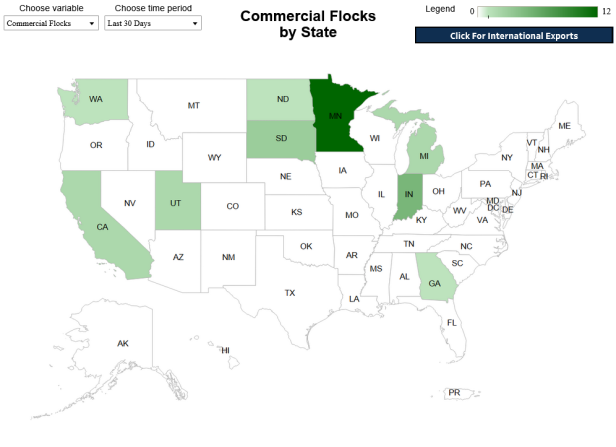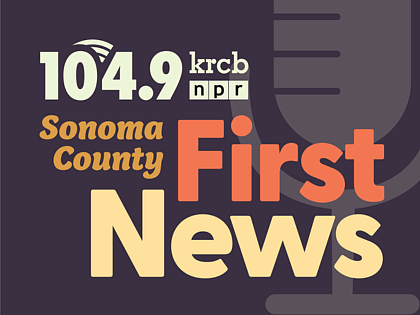 photo credit: U.S. Department of Agriculture
photo credit: U.S. Department of AgricultureUSDA Highly Pathogenic Avian Influenza outbreak map, showing state's with active cases on November 4, 2025.
More major outbreaks of bird flu at commercial facilities in Sonoma County have been confirmed by the U.S. Department of Agriculture.
The outbreaks have resulted in the killing of tens of thousands of chickens and ducks.
It's a bad start to the winter season, as migratory birds move through Sonoma County on the Pacific Flyway, raising the chances for infections at poultry and duck facilities from passing water fowl.
KRCB News' Noah Abrams spoke with Santa Rosa Press Democrat investigative reporter Phil Barber about his recent coverage of the avian flu infections.
Noah Abrams: So, it seems like highly pathogenic avian influenza, to give it its full name, is back infecting flocks in Petaluma. What have you been told or what have you heard in speaking with the folks at Reichardt Duck Farm?
It looks like recently a table egg laying operation was infected as well. Have you been able to hear about or learn who had to euthanize their flocks or who was infected recently in this latest round?
Phil Barber: So, I talked to Phil Reichardt at length about about the outbreak at Reichardt Duck Farm and what that might have meant. I was not able to ascertain the second site. You're right, it is an egg farm. I reached out to what I thought were [a] couple of the most likely candidates just based on the spread of the virus two winters ago and wasn't able to determine where that was. But it's an ominous tone. It's early in the flu season.
We're just starting the big migration along the Pacific Flyway and here we are with two major outbreaks and we know that two years ago this happened, and I think 10 farms wound up being hit, millions of birds put down. I will say the industry learned a lot from that experience.
They have really ramped up communications amongst farms, and with state and federal regulators, and they also, I think, have really tightened up biosecurity measures and euthanasia protocols. They, Reichardt, jumped into that really fast, but it's still kind of scary and disheartening and you know when I talked to Phil Reichardt, that was the first outbreak...in California this winter actually, if you can call this winter.
Phil [Reichardt] was telling me about how quickly they sprang into action and how the hope was that would prevent it from spreading to another farm and then two days later, here we are seeing that there is an egg farm listed on the USDA outbreak site.
NA: Yeah, unfortunate situation. Did he say with the communication with state and federal resources and sort of agricultural experts, has there been any effect on the federal side of things with some of the clear out at USDA that we saw earlier in the year with DOGE [Department of Government Efficiency]?
I think the animal and plant health division was hit at the USDA, which some folks were concerned would affect communicable diseases in livestock and poultry and other farm animals in the US.
Did you say that that's been an issue?
PB: No, that's a really good question and it's something I've been thinking of too. Phil Reichardt didn't signal that to me and I will say that these outbreaks, they were posted really fast to the USDA Animal and Plant Health [database] that you mentioned. There's a database that's maintained online for the public and those outbreaks went up really fast. So that didn't seem to be impaired.
You have to wonder if there are impacts in terms of federal regulators coming to your site to help you with euthanasia or re-population or any of that stuff, but I do think that the local producers have gotten pretty good at acting independently on that. They know what to do.
I think they can at least get approval from the from the state to, you know, start for instance euthanizing birds when there's an outbreak. I have not heard that anyone has been affected by government staff shortages or anything like that, but it's definitely something to keep an eye on.
NA: In your piece, Phil Reichardt said that, you know, this has been years in a row [of infections], and as you've said too, you know, he talked about COVID, and they had the protesters with Direct Action Everywhere, which has been a hot topic for them. You have outbreaks in previous years, a pretty unprecedented wave of [Highly Path Avian Influenza] across the country that's affecting different agricultural and poultry producers. So, is he concerned about just being able to keep the doors open and being able to sell ducks?
PB: Phil [Reichardt's] tone was sort of defiantly optimistic while admitting all of the challenges being thrown at them and you mentioned the big ones. I would just add to that, you know, simple economics and market factors. They're big farms in our area but compared to the Central Valley and the Midwest, they're not these big corporate operations.
So I think it's harder and harder for them to compete anyway, and then to be hit with all these challenges. It's rough, but Reichardt said to me, it's kind of all they know. He grew up in the business. His siblings did too. Mike Weber and his brother, it's what they do and I think they'll continue to do it for as long as they can.
So, I didn't get any sense from Phil Reichardt that there were big decisions going on at the coffee table in his house about whether we can continue to do this, but it does seem to be getting harder and harder.

 Live Radio
Live Radio




